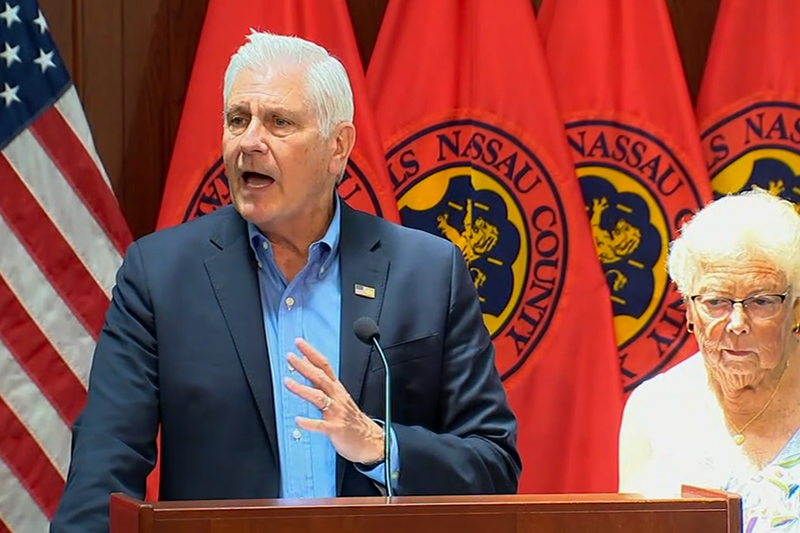When a Trans Swimmer Broke Her College’s Record, Hate Ensued
A New Jersey college received death threats after a transgender student athlete broke a women's school swimming record.

A transgender swimmer at a Division III college in New Jersey recently broke the school’s record in the 100-yard women’s butterfly event.
The win sparked a backlash on social media that included death threats.
On Saturday, Nov. 18, Meghan Cortez-Fields of Ramapo College in Mahwah, N.J., won the women’s 100-yard butterfly at a meet hosted by Misericordia University in Dallas, Pennsylvania, with a time of 57.22 seconds, beating the school’s previous event record of 57.97 seconds.
Cortez-Fields also won — but did not set a record in — the 200-yard individual medley race, with a time of 2 minutes, 12.05 seconds, placed second in the 200-yard butterfly with a time of 2 minutes, 17.85 seconds, and was a member of the school’s 200-meter and 400-meter freestyle and medley relay teams at the meet.
A senior majoring in chemistry who hails from College Station, Texas, Cortez-Fields previously raced on the men’s team for three seasons.
The Ramapo College swim team recognized the team’s performance on its Instagram page. The post attracted hordes of anti-LGBTQ trolls who left negative comments.
College spokesperson Lisa Ambrose said there were many “vulgar and horrible comments, as well as threats toward campus community members and death threats over Ramapo College letting Meghan swim on the women’s team.”
The death threats have since been reported to law enforcement authorities.
Ambrose attributed the increased attention on the post to Riley Gaines, a former University of Kentucky swimmer best known for tying for fifth place with former University of Pennsylvania transgender swimmer Lia Thomas at the NCAA Division I Swimming and Diving Championships in 2022.
Gaines has since become an anti-transgender pundit and advocate for single-sex spaces for women. She has been one of the key figures urging Republican-led states to pass laws like the so-called “women’s bill of rights,” which would prohibit recognition of transgender identity and ban trans individuals from single-sex facilities.
On Sunday, Gaines wrote on the social media platform X, “Ramapo College swimmer in NJ goes from less than mediocre male swimmer to a record smasher competing against the women. Hm, where have we seen this before? #SaveWomensSports”.
After the post on Ramapo College’s Instagram account congratulating Cortez-Fields for her win was removed, Gaines wrote, “They always hate the public attention after being called out for their discrimination and mistreatment of women.”
Ramapo College swimmer in NJ goes from less than mediocre male swimmer to a record smasher competing against the women.
Hm, where have we seen this before? #SaveWomensSports pic.twitter.com/4py4cHokkJ
— Riley Gaines (@Riley_Gaines_) November 19, 2023
Ambrose said that it was not the college but a team peer who deleted the post after the comments became increasingly threatening.
“The college recognizes that the deletion of a social media post can cause speculation,” she said. “The peer’s decision-making in this situation, however, was centered around empathy and compassion for a fellow member of the college community and, as such, it has the college’s full support.
“We are always proud when our student-athletes do well,” Ambrose added. “We celebrate all of our students.”
Ambrose noted that the college’s Instagram and Facebook accounts are still receiving hostile messages.
“People will find any post that has nothing to do with this and use it as an opportunity to share their opinions which, while they are welcome to do, they also use it to share messages of hate and of violent acts,” Ambrose told NorthJersey.com. “What people don’t realize is that this impacts everyone in our community. There is a whole team involved here.”
The controversy over Cortez-Fields’s win led one lawmaker, State Sen. Michael Testa (R-Cumberland Co.) to trumpet a bill he introduced to ban transgender athletes from female-designated sports teams.
“Democrats in NJ are too ignorant to care about this very serious issue,” Testa tweeted in response to Gaines. “That’s why we must pass my bill, the Fairness in Women’s Sports Act, in NJ. Enough of this nonsense. It’s way overdue that we do all we can to protect our female athletes.”
.@Riley_Gaines_ Democrats in NJ are too ignorant to care about this very serious issue. That’s why we must pass my bill, the Fairness in Women’s Sports Act, in NJ.
Enough of this nonsense. It’s way overdue that we do all we can to protect our female athletes. https://t.co/dHWOOBjkwW
— Mike Testa (@TestaForNJ) November 21, 2023
The bill is unlikely to pass or even receive a hearing, given that Democrats control both chambers of the New Jersey Legislature.
While many commenters accused Cortez-Fields of “cheating” or stealing opportunities away from other female athletes, Ambrose defended the college’s decision to let her compete on the women’s team, arguing that the school is in compliance with NCAA guidelines.
In 2022, the NCAA Board of Governors declined to pass an across-the-board ban on transgender athletes competing on female sports teams, instead deferring to national governing bodies of sport to set their own guidelines for transgender participation.
Under USA Swimming’s policy, transgender female athletes must be examined by a three-person panel of independent medical experts, who will determine whether the swimmer’s prior physical development as a man gives them a competitive advantage over cisgender female competitors.
The swimmer must also provide bloodwork showing that the concentration of testosterone in her blood has been less than 5 nanomoles per liter continuously for at least 36 months.
USA Swimming’s policy is considered less strict than the one adopted by FINA, the international governing body for water sports, which prohibits transgender athletes from competing in women’s events unless they have never gone through male puberty or have been on testosterone suppressants since age 12.
The few athletes who meet that criteria must provide evidence that they have continuously maintained their testosterone levels below 2.5 nanomoles per liter since transitioning to compete.
Speaking with the college’s student-run newspaper The Ramapo News last year, Cortez-Fields said she was inspired by Lia Thomas’s success to continue competing.
“Thomas is an inspiration to me in that way, but also I felt so bad for her because I know exactly what she was going through,” Cortez-Fields said. “Even going into this season, I had a fear of succeeding, because I don’t want what happened to her to happen to me.”
She also noted that she has received support from some of her teammates. When she was transitioning while competing for the men’s team last year, the school permitted her to use the women’s locker room, but not the women’s team locker room. Some members of the women’s team subsequently refused to use the team locker room and changed in the regular women’s locker room to show solidarity with her.
“I think I’m in a very unique position being one of the first [trans athletes] here at Ramapo,” Cortez-Fields said. “I hope that people can see what I’m going through, and to show I can do this.”
Support Metro Weekly’s Journalism
These are challenging times for news organizations. And yet it’s crucial we stay active and provide vital resources and information to both our local readers and the world. So won’t you please take a moment and consider supporting Metro Weekly with a membership? For as little as $5 a month, you can help ensure Metro Weekly magazine and MetroWeekly.com remain free, viable resources as we provide the best, most diverse, culturally-resonant LGBTQ coverage in both the D.C. region and around the world. Memberships come with exclusive perks and discounts, your own personal digital delivery of each week’s magazine (and an archive), access to our Member's Lounge when it launches this fall, and exclusive members-only items like Metro Weekly Membership Mugs and Tote Bags! Check out all our membership levels here and please join us today!



























You must be logged in to post a comment.